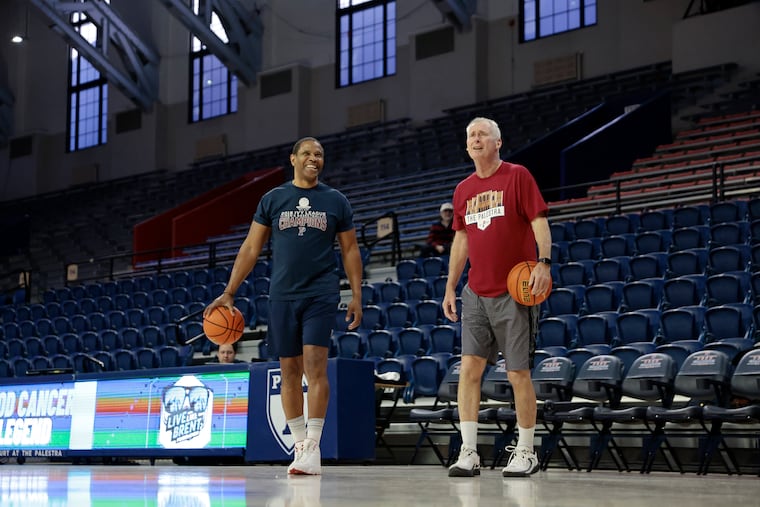Voices of Penn’s basketball past reflect on the Quakers’ present challenges
The 1979 Final Four team was honored on Saturday at the Palestra as part of Penn's annual basketball alumni weekend.

Forty-five years ago, the Palestra held a secret.
To be sure, there have been a lot of secrets under those famed steel arches in the arena’s near-century of existence. But the most famous one of all is still Penn’s 1979 men’s Final Four team, which shocked the nation with its upset run past Iona, North Carolina, Syracuse, and St. John’s.
“We’ve got a secret” was then-assistant coach Bob Staak’s catchphrase, and over 2 1/2 electric weeks the nation learned it. Staak’s boss, Bob Weinhauer, outfoxed coaches Jim Valvano, Dean Smith, Jim Boeheim, and Lou Carnesecca on the way to the national semifinals.
The nation knows that Final Four for Magic Johnson and Larry Bird’s star power, and their title-game matchup that made college hoops must-see TV. But in Philadelphia, it was as much about the underdogs, even if Johnson’s Spartans crushed them. (The fourth team that year: DePaul, which beat Penn in the third-place game in overtime.)
“We were known, but when you’re going up against North Carolina, and everybody else is looking at us … we would be probably the equivalent of a 16-seed back then, even though we weren’t,” said Ted Flick, a reserve forward on Penn’s 1979 squad.
“It was a secret that we could play with these guys, and nobody knew that,” Flick said. “We surprised a lot of people.”
» READ MORE: Why is the Wells Fargo Center putting itself at the center of the local college hoops scene?
‘Changing of the guard’
The echoes rang out again Saturday night on 33rd Street in a tribute to that team, paid at the modern-day team’s game against Harvard. Unfortunately, only Ted Flick, Vincent Ross, and Tom Leifsen showed up, as plans for a bigger reunion fizzled out in the last few days.
“I’d like to have the Final Four team get together once a year for one game,” said Flick, who’s long been a regular at Penn’s annual alumni games. A free throw and three-point contest Saturday afternoon showed he still has his shooting form.
There are no secrets in college basketball anymore, with so many games, like Saturday’s against Harvard, televised and all of them streamed online. The Ivy League has done a great job of competing nationally, including Princeton’s run to last season’s men’s Sweet 16 and a terrific standard on the women’s side.
But the next challenge could be one of the biggest yet: staying competitive in the NIL — name, image, likeness — era. The Ivy League doesn’t do fundraising collectives for players, just as it doesn’t do athletic scholarships or any merit-based aid.
(Come to think of it: How would Ivy League academic scholarships work?)
Players can have endorsement deals, and Penn recently launched a new program to connect them with local businesses. But collectives are still firmly off the table.
“It’s a changing of the guard in college basketball, and if I told you I thought I had an answer for it, I’d be lying,” said Jeff Schiffner, a backcourt star of the early 2000s who was also at the alumni gathering. “I think that you have to change with the times a little bit, and I think the Ivy League programs are going to have to do that as well.”
» READ MORE: Penn’s hard truth? In the case of college sports and the Ivy League, it isn’t all about the money
‘Murky waters’
The wide-open transfer portal matters, too. While the NBA scouts at the Palestra on Saturday were likely there to watch Harvard’s freshman sensation Malik Mack, they might have heard about Penn freshman Tyler Perkins’ big start to his college career.
Could he someday follow in Jordan Dingle’s footsteps, giving up a Penn degree for NIL money on a bigger-conference stage? Just the thought is new for Quakers fans — but plenty have had it.
“That’s a hard question,” Flick said. “NIL is a big deal. Obviously, with Penn’s recruiting and the Ivy League’s restrictions on scholarships, the [transfer] portal where kids can up and change at the drop of a year …”
He recalled Fran McCaffery, now the famed coach at Iowa, having to sit out a season when he transferred from Wake Forest to Penn in 1978. The season he missed ended up being the one of the Final Four.
That one-year-out rule was NCAA bedrock for decades, from the 1960s until 2021.
“It is murky waters, and I can’t really give you an honest opinion as to where it’s going to go,” Flick said.
“I don’t know if anybody has the answers to what’s going on in college athletics,” Quakers coach Steve Donahue said. “I listen, I read a ton. Even though we lost someone to an opportunity, I think it’s a bit of an outlier.”
Schiffner believes the benefits of an Ivy League degree can still keep athletes on campus for four years. But he called on Penn and the conference to leverage that, not just sit on their laurels.
“I think here at Penn, you have something that’s sticky to kids coming here, which is getting a degree,” Schiffner said. “I think that goes a long way, and I’m not necessarily sure that exists at a lot of other levels of Division I basketball.”
For now, at least. It might not forever.
Staff writer Matthew Frank contributed to this article.